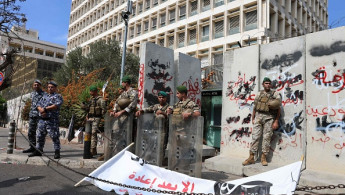Civil society groups submit petition to EU, US calling for sanctions on Lebanese leaders
Accountability Now and the Union for Depositors submitted a petition to the EU and US Treasury on Monday to impose sanctions on politicians and bankers who have "obstructed reforms" in Lebanon.
The two organisations submitted a 120-page petition two the EU and the US providing legal evidence of how officials and bankers have "pursued their own private interests to the detriment of the Lebanese people and state."
The sanctions request follows a visit by Lebanese civil society in September, where a delegation met with US leaders to lobby for targeted sanctions on Lebanese individuals.
In July, the EU adopted a framework which allows it to impose targeted sanctions on individuals in Lebanon who hamper reforms and engage in corruption. The US has also targeted certain officials for corruption, such as former Foreign Minister Gebran Bassil in November 2020.
"We target those individuals who have repeatedly and systematically sabotaged the reform plans requested by the international community to unlock aid for the benefit of the population," Zeina Wakim, a lawyer for Accountability Now, told The New Arab.
Lebanon is mired in a political and economic crisis described by the World Bank as one of the world's worst in the last 150 years.
Over three-quarters of the population have been plunged into poverty and basic services are virtually nonexistent, with a crippled health sector and a barely functioning power grid.
Much of the country's woes have been attributed to a political and economic elite which uses their positions for personal enrichment. According to an August World Bank report, "elite capture of State's resources for private gains necessitated weakening of public service delivery."
The IMF has outlined reforms necessary for the country to access international funding – already pledged to the country – but the Lebanese state has failed to pass any substantial reforms since the beginning of the crisis in 2019.
In the meantime, most Lebanese are unable to access their savings which were frozen by banks in 2019. An increasingly devalued currency has meant that their savings have lost much of their value if they are ever to be returned to depositors.
Banks and the government have traded blame for the lack of reforms, with the Lebanese Banking Association (ABL) accusing the state of ignoring its suggestions and of misusing the Central Bank’s funds. Rights groups have accused both parties of delaying reforms for mutual benefits.
According to the Depositor's Union, sanctions could push the banking sectors towards reform in the banking sector and curtail its political lobbying.
"Sanctions can force bankers to push for banking sector restructuring … and stop their bad influence on the MPs and government," Dina Abu Zour, a lawyer with the Depositor's Union, told TNA.
"Maybe such sanctions could find some solutions in favor of depositors, especially because that sanctions could harm their interests abroad," Zour added.
Neither the EU nor US has publicly commented on whether or not additional sanctions on Lebanese politicians will be adopted.





 Follow the Middle East's top stories in English at The New Arab on Google News
Follow the Middle East's top stories in English at The New Arab on Google News


